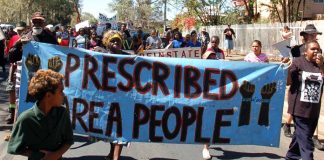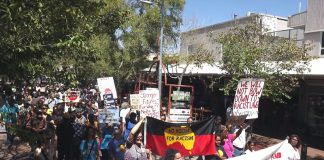Gurindji Freedom day, August 26, was marked by protests against the NT Intervention. Freedom Day commemorates the famous Gurundji walk-off from Wave Hall station in 1966, immortalised in the Paul Kelly song, From Little Things, Big Things Grow.
Aboriginal stockmen and domestic servants, paid in rations by cattle baron Lord Vestey, went on strike to demand equal pay with white workers. This struggle soon spilled over into a fight for land rights that won a historic victory on August 26, 1975 when Gough Whitlam granted land title to Daguragu, famously pouring sand into the hands of strike leader Vincent Lingiari.
The day is usually a time for celebration, but this year’s activities, on the 45-year anniversary of Freedom Day, condemned the racist NT Intervention that has stripped back many of the rights won through the walk-off.
The government has seized control of Daguragu under a compulsory five-year lease. Cuts to Community Development Employment Projects (CDEP) and the take-over of the Daguragu Community Government Council by a new mega-Shire, controlled from Katherine 450 kilometres away, have decimated the community.
Everything has been closed down: the arts centre, workshop, brick-making enterprise, bakery, family centre, health clinic, CDEP office, nursery and canteen. Assets such as road grading equipment and buses have been taken.
Philip Chubb, who used to work at the bakery, said that all of his fellow bakers were now unemployed due to lack of funding and the racism of the Shire management. “Most young people are just working for their BasicsCard now” said Philip. The new CDEP scheme forces people to work for the income managed dole payments in the form of the BasicsCard.
Regina, who used to work as a child nutritionist at the Daguragu family centre, is also unemployed. She said that the community was facing a new “stolen generation”: “It’s hard for the young mothers now. There are no support services for them and if their babies don’t put on weight, they’ll be taken away by welfare.
“We had five children taken from one family last year. They just flew in on a plane and took those children to Darwin, leaving their parents suffering. They can’t be with us here to celebrate Freedom Day, because they are in Darwin fighting to get their children back”.
Fighting the government
On Freedom Day, hundreds of Gurindji people and supporters from across the country marched from the Shire office in Kalkaringi down to the Victoria River, in a re-enactment of the original walk-off. The locals carried banners with anti-Intervention slogans such as “Stop the NT Intervention, Gurindji Demand Community Control”.
A meeting by the river then heard speakers both recount the struggles of the past and condemn the Intervention. Local leader Gus George said “This Freedom Day we are talking up strongly and fighting the government. We got no rights to have a say in the community. Government took the community away. We had Aboriginal owned enterprise and all, but they took all the funding away. All missing. That’s true for every community in the Territory”.
A Central Land Council (CLC) full council meeting was held in the days leading up to Freedom Day. Indigenous Affairs Minister Jenny Macklin addressed the meeting, trying to sell her government’s new Stronger Futures policy that will continue most Intervention measures after their 2012 sunset clause.
Macklin faced a protest at the Kalkaringi airport from locals and then angry questioning from CLC delegates. After a presentation from the Intervention Rollback Action Group, council delegates voted to endorse Rebuilding from the Ground Up: An Alternative to the NT Intervention, an eleven point program based on Aboriginal community control championed by Stop the Intervention Collective Sydney and the national campaign.
CLC delegates Rob Roy and Ngarla Kunoth-Monks read out the Land Council’s own statement to the Freedom Day meeting: “We demand an apology from our governments for the terrible recent policies that encourage assimilation and ‘normalisation’—this amounts to cultural genocide”.
The national Freedom Day activities have created a renewed momentum amongst the Gurindji. Just days after Freedom Day, a wildcat strike by shire workers successfully forced the resignation of a racist manager.
In Sydney, the Stop the Intervention Collective held a 100 strong lunchtime protest outside the office of Labor MP Tanya Plibersek.
The campaign against income management has extended into the Western suburbs, where a protest will be held on October 8, calling for a moratorium on income management.
Sign the petition calling for a Moratorium on Income management: Sign the petition calling for a Moratorium on Income management:





